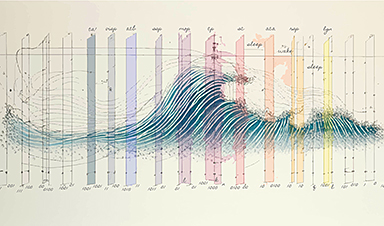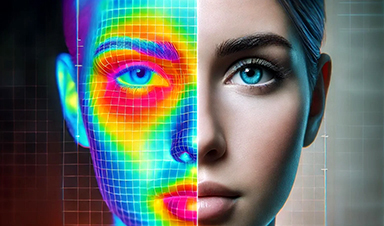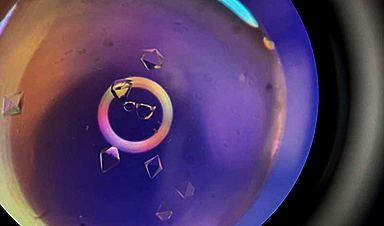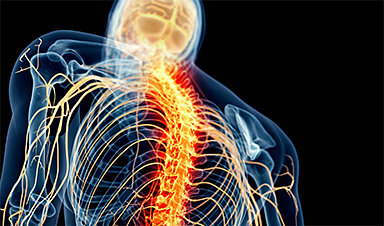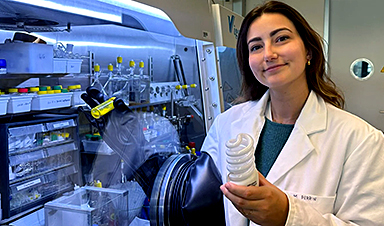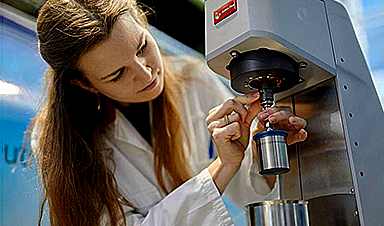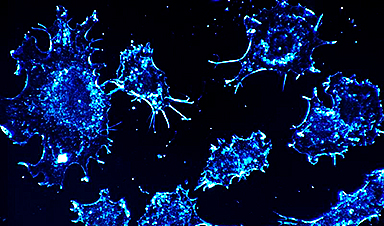A new study indicates that 3D retinal scans could revolutionize the early detection and monitoring of kidney disease, offering a non-invasive and efficient diagnostic tool.
3D eye scans can reveal vital clues about kidney health that could help to track the progression of disease, research suggests.
The advance could revolutionize the monitoring of kidney disease, which often progresses without symptoms in the early stages.
Potential of 3D Eye Scans
Experts say the technology has the potential to support early diagnosis as current screening tests cannot detect the condition until half of the kidney function has been lost.
Researchers used highly magnified images to detect changes to the retina – the layer of tissue at the back of the eye that senses light and sends signals to the brain. They found that the images offer a quick, non-invasive way to monitor kidney health.
The eye is the only part of the body where it is possible to view a key process called microvascular circulation – and this flow of blood through the body’s tiniest vessels is often affected in kidney disease.
Research Findings
Researchers at the University of Edinburgh investigated whether 3D images of the retina, taken using a technology called optical coherence tomography (OCT), could be used to identify and accurately predict the progression of kidney disease.
OCT scanners – used in most high street opticians – use light waves to create a cross-sectional picture of the retina, displaying each individual layer, within a few minutes.
The team looked at OCT images from 204 patients at different stages of kidney disease, including transplant patients, alongside 86 healthy volunteers.
They found that patients with chronic kidney disease had thinner retinas compared with healthy volunteers. The study also showed that thinning of the retina progressed as kidney function declined.
These changes were reversed when kidney function was restored following a successful transplant. Patients with the most severe form of the disease, who received a kidney transplant, experienced rapid thickening of their retinas after surgery.
Wider Implications
More people than ever are at risk of kidney disease, which is often caused by other conditions that put a strain on the kidneys, including diabetes, high blood pressure and obesity.
With further research, regular eye checks could one-day aid early detection and monitoring to prevent the disease from progressing. It could also allow patients to make lifestyle changes that reduce the risk of health complications, experts say.
The technology, supported by Heidelberg Engineering’s imaging platform, could also aid the development of new drugs, the research team says.
It could do so by measuring changes in the retina that indicate whether – and in what way – the kidney responds to potential new treatments.
Future Research and Impact
The researchers say further studies – including longer-term clinical trials in larger groups of patients – are needed before the technology can be routinely used.
An estimated 7.2 million people in the UK live with chronic kidney disease – more than 10% of the population. It costs the NHS around £7 billion each year.
The study will be published today (December 5) in the journal Nature Communications. It was funded by Kidney Research UK, and supported by Edinburgh Innovations, the University’s commercialization service.
Dr. Neeraj (Bean) Dhaun, Professor of Nephrology at the University of Edinburgh’s Centre for Cardiovascular Science, said: “We hope that this research, which shows that the eye is a useful window into the kidney, will help identify more people with early kidney disease – providing an opportunity to start treatments before it progresses.
“It also offers potential for new clinical trials and the development of drug treatments for a chronic disease that, so far, has proved extremely difficult to treat.”
Dr. Aisling McMahon, executive director of research and policy at Kidney Research UK, said: “Kidney patients often face invasive procedures to monitor their kidney health, often on top of receiving grueling treatments like dialysis.
“This fantastic research shows the potential for a far kinder way of monitoring kidney health. We are continuing to support the team as they investigate whether their approach could also be used to diagnose and intervene in kidney disease earlier.”
Reference: “Choroidal & retinal thinning in chronic kidney disease are modifiable with treatment & independently associate with eGFR decline” 5 December 2023, Nature Communications.
DOI: 10.1038/s41467-023-43125-1
News
The Silent Battle Within: How Your Organs Choose Between Mom and Dad’s Genes
Research reveals that selective expression of maternal or paternal X chromosomes varies by organ, driven by cellular competition. A new study published today (July 26) in Nature Genetics by the Lymphoid Development Group at the MRC [...]
Study identifies genes increasing risk of severe COVID-19
Whether or not a person becomes seriously ill with COVID-19 depends, among other things, on genetic factors. With this in mind, researchers from the University Hospital Bonn (UKB) and the University of Bonn, in [...]
Small regions of the brain can take micro-naps while the rest of the brain is awake and vice versa
Sleep and wake: They're totally distinct states of being that define the boundaries of our daily lives. For years, scientists have measured the difference between these instinctual brain processes by observing brain waves, with [...]
Redefining Consciousness: Small Regions of the Brain Can Take Micro-Naps While the Rest of the Brain Is Awake
The study broadly reveals how fast brain waves, previously overlooked, establish fundamental patterns of sleep and wakefulness. Scientists have developed a new method to analyze sleep and wake states by detecting ultra-fast neuronal activity [...]
AI Reveals Health Secrets Through Facial Temperature Mapping
Researchers have found that different facial temperatures correlate with chronic illnesses like diabetes and high blood pressure, and these can be detected using AI with thermal cameras. They highlight the potential of this technology [...]
Breakthrough in aging research: Blocking IL-11 extends lifespan and improves health in mice
In a recent study published in the journal Nature, a team of researchers used murine models and various pharmacological and genetic approaches to examine whether pro-inflammatory signaling involving interleukin (IL)-11, which activates signaling molecules such [...]
Promise for a universal influenza vaccine: Scientists validate theory using 1918 flu virus
New research led by Oregon Health & Science University reveals a promising approach to developing a universal influenza vaccine—a so-called "one and done" vaccine that confers lifetime immunity against an evolving virus. The study, [...]
New Projects Aim To Pioneer the Future of Neuroscience
One study will investigate the alterations in brain activity at the cellular level caused by psilocybin, the psychoactive substance found in “magic mushrooms.” How do neurons respond to the effects of magic mushrooms? What [...]
Decoding the Decline: Scientific Insights Into Long COVID’s Retreat
Research indicates a significant reduction in long COVID risk, largely due to vaccination and the virus’s evolution. The study analyzes data from over 441,000 veterans, showing lower rates of long COVID among vaccinated individuals compared [...]
Silicon Transformed: A Breakthrough in Laser Nanofabrication
A new method enables precise nanofabrication inside silicon using spatial light modulation and laser pulses, creating advanced nanostructures for potential use in electronics and photonics. Silicon, the cornerstone of modern electronics, photovoltaics, and photonics, [...]
Caught in the actinium: New research could help design better cancer treatments
The element actinium was first discovered at the turn of the 20th century, but even now, nearly 125 years later, researchers still don't have a good grasp on the metal's chemistry. That's because actinium [...]
Innovative Light-Controlled Drugs Could Revolutionize Neuropathic Pain Treatment
A team of researchers from the Institute for Bioengineering of Catalonia (IBEC) has developed light-activated derivatives of the anti-epileptic drug carbamazepine to treat neuropathic pain. Light can be harnessed to target drugs to specific [...]
Green Gold: Turning E-Waste Into a Treasure Trove of Rare Earth Metals
Scientists are developing a process inspired by nature that efficiently recovers europium from old fluorescent lamps. The approach could lead to the long-awaited recycling of rare earth metals. A small molecule that naturally serves [...]
Cambridge Study: AI Chatbots Have an “Empathy Gap,” and It Could Be Dangerous
A new study suggests a framework for “Child Safe AI” in response to recent incidents showing that many children perceive chatbots as quasi-human and reliable. A study has indicated that AI chatbots often exhibit [...]
Nanoparticle-based delivery system could offer treatment for diabetics with rare insulin allergy
Up to 3% of people with diabetes have an allergic reaction to insulin. A team at Forschungszentrum Jülich has now studied a method that could be used to deliver the active substance into the [...]
Nanorobot kills cancer cells in mice with hidden weapon
Researchers at Karolinska Institutet in Sweden have developed nanorobots that kill cancer cells in mice. The robot's weapon is hidden in a nanostructure and is exposed only in the tumor microenvironment, sparing healthy cells. [...]



